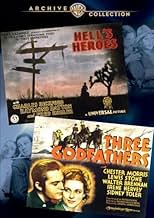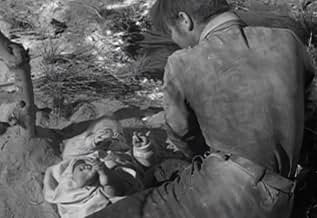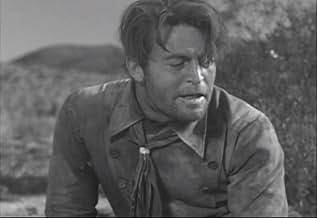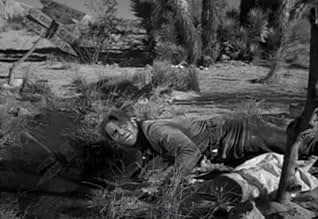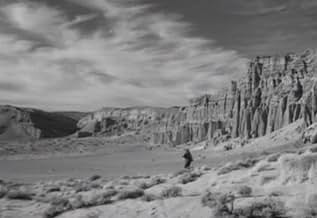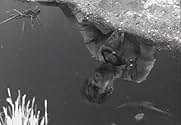VALUTAZIONE IMDb
7,3/10
1102
LA TUA VALUTAZIONE
Aggiungi una trama nella tua linguaThree fugitives risk their lives to bring a newborn baby out of the desert to safety.Three fugitives risk their lives to bring a newborn baby out of the desert to safety.Three fugitives risk their lives to bring a newborn baby out of the desert to safety.
- Regia
- Sceneggiatura
- Star
Jean Kircher
- Baby
- (as Jean Kirchner)
Bernard Carr
- Ralph
- (non citato nei titoli originali)
Richard Cramer
- Prospector Dancing with Blackie
- (non citato nei titoli originali)
Recensioni in evidenza
Though Chester Morris and Lewis Stone aren't exactly names identified with westerns, together with Walter Brennan they do a very nice job in bringing this earlier and harsher version of the story of Three Godfathers, outlaws who give an infant a chance at life.
Rather than the Three Godfathers from John Ford's later and more famous version, a trio of happy go lucky outlaws who rob a bank and get a posse after them, these are a much tougher group who drift into New Jerusalem one at a time. Morris is from there and hasn't got pleasant memories of the place. He's the one who wants to rob the bank and give a little payback to the town, especially to bank manager Robert Livingston who's going to marry Irene Hervey, Morris's former sweetheart.
Of course out on the desert the trio finds a dying woman with an infant and Brennan and Stone want to help, but Morris very reluctantly goes along. Let's just say that they meet a much meaner end than John Ford gave them in his version.
I do love the chemistry between Stone and Brennan, the college graduate who carries Shakespeare and Schopenhauer in his saddlebags and the illiterate nabob. Stone does not however demean Brennan at all and my favorite scene is him singing Boola Boola in the desert which Morris identifies for Brennan as Stone's old school song.
Richard Boleslavski does not give us the sweeping desert vistas of John Ford's Monument Valley, but this Three Godfathers has a class and dignity all its own. I wish it was broadcast more often.
Rather than the Three Godfathers from John Ford's later and more famous version, a trio of happy go lucky outlaws who rob a bank and get a posse after them, these are a much tougher group who drift into New Jerusalem one at a time. Morris is from there and hasn't got pleasant memories of the place. He's the one who wants to rob the bank and give a little payback to the town, especially to bank manager Robert Livingston who's going to marry Irene Hervey, Morris's former sweetheart.
Of course out on the desert the trio finds a dying woman with an infant and Brennan and Stone want to help, but Morris very reluctantly goes along. Let's just say that they meet a much meaner end than John Ford gave them in his version.
I do love the chemistry between Stone and Brennan, the college graduate who carries Shakespeare and Schopenhauer in his saddlebags and the illiterate nabob. Stone does not however demean Brennan at all and my favorite scene is him singing Boola Boola in the desert which Morris identifies for Brennan as Stone's old school song.
Richard Boleslavski does not give us the sweeping desert vistas of John Ford's Monument Valley, but this Three Godfathers has a class and dignity all its own. I wish it was broadcast more often.
Three Godfathers is a wonderful little (for MGM) film that keeps its' story simple and to the heart. Three bank robbers find a woman dying in the desert and as she dies they decide to save her baby to the risk of their own lives. This is also the third of four versions of this story; with each filmed over a 32 year span with each film well-documenting the growth of the quality of filmmaking technology and technique in that era. The 1916 silent version, which is lost, demonstrates the early years of 3 act narrative film storytelling. The 1929 version shows the then-brand new sound technology; this 1936 film illustrates sound production entering its' prime years with a musical score and more fluid camera work and the 1948 version shows off color photography, which was starting to become the norm for the industry going into the 1950s. It can be said this story, based on a book, is a true stalwart of old-Hollywood and I would argue it would be welcomed to a remake in the 21st Century.
The actors and simple, but impactful direction make the film. Richard Boleslawski, who would sadly die a year later, directs with an abundant use of close-ups for that time. This lets the actors have their moments, and they come through in spades. Chester Morris is the lead and the least moral of the bank robbers. He plays Bob, a man angered by the people in the town, whose bank he is robbing. He is motivated to get back at the town which despises him and the girl who refused him, Molly (Irene Hervey), and he leads the robbery, shooting her new fiancé on his way out of the robbery. He isn't a very sympathetic character until the second half when he must decide what he will do with the helpless baby. Morris is interesting to watch and the depths of depravity in his character are well-played when he tries to pray as he has to face his fate in the end. Lewis Stone is simply outstanding as Doc, an old man who knows his time is short and quickly decides the money he got in the robbery isn't worth a thing compared to the life of the child. He takes on the full responsibility as long as he can and you can read in the melancholy in Stone's acting how his character is at peace with his fate when he looks into the baby's face. Walter Brennan, too, is excellent, as the simple-minded Gus, a middle-aged man, who is good friends with Doc and believes in him and takes on the responsibility too, of feeding and caring for the child at the expense of his own life.
This could be certainly called sentimental, and it is, but the story is so simple, that the sentimentality naturally comes out of it. Any human being with an ounce of morality, who would come upon a helpless baby, would do anything to save it. It's a part of our nature. What is great about this film is watching how each character faces the circumstances he is in and how he reacts to the constantly dangerous scenario of running out of water and being too far from safety in the scorching desert and the sacrifices they have to make with such limitations. The story takes place at Christmas, which makes the three main characters' redemption a religious allegory as they save the child, valuing the promise of an innocent over themselves. Doc's philosophical nature also lends this film to being much more thoughtful than your average western. The mixing of the brutality of the old west, with religion and philosophy give this a heartening feeling. Highly recommended to fans of simple, effective and emotional storytelling.
The actors and simple, but impactful direction make the film. Richard Boleslawski, who would sadly die a year later, directs with an abundant use of close-ups for that time. This lets the actors have their moments, and they come through in spades. Chester Morris is the lead and the least moral of the bank robbers. He plays Bob, a man angered by the people in the town, whose bank he is robbing. He is motivated to get back at the town which despises him and the girl who refused him, Molly (Irene Hervey), and he leads the robbery, shooting her new fiancé on his way out of the robbery. He isn't a very sympathetic character until the second half when he must decide what he will do with the helpless baby. Morris is interesting to watch and the depths of depravity in his character are well-played when he tries to pray as he has to face his fate in the end. Lewis Stone is simply outstanding as Doc, an old man who knows his time is short and quickly decides the money he got in the robbery isn't worth a thing compared to the life of the child. He takes on the full responsibility as long as he can and you can read in the melancholy in Stone's acting how his character is at peace with his fate when he looks into the baby's face. Walter Brennan, too, is excellent, as the simple-minded Gus, a middle-aged man, who is good friends with Doc and believes in him and takes on the responsibility too, of feeding and caring for the child at the expense of his own life.
This could be certainly called sentimental, and it is, but the story is so simple, that the sentimentality naturally comes out of it. Any human being with an ounce of morality, who would come upon a helpless baby, would do anything to save it. It's a part of our nature. What is great about this film is watching how each character faces the circumstances he is in and how he reacts to the constantly dangerous scenario of running out of water and being too far from safety in the scorching desert and the sacrifices they have to make with such limitations. The story takes place at Christmas, which makes the three main characters' redemption a religious allegory as they save the child, valuing the promise of an innocent over themselves. Doc's philosophical nature also lends this film to being much more thoughtful than your average western. The mixing of the brutality of the old west, with religion and philosophy give this a heartening feeling. Highly recommended to fans of simple, effective and emotional storytelling.
Not as well known as the 1948 John Ford version, this one does not spoon feed the issues to the viewer. Harsh, uncompromising and utterly devoid of false bonhomie, Boleslawski made this at almost the same time as the screwball classic, THEODORA GOES WILD.
This was a complete surprise after seeing the John Wayne version first. First of all it is one of the toughest westerns I've seen from the 1930's. Chester Morris is remarkable in his role. The subtlety and naturalism in his acting is really unusual for a film from this era. He says things that would be delivered with a theatrical snarl in lesser westerns but here it comes off believable. Lewis Stone gives depth and Walter Brennan goes from annoying to sympathetic by the end of the film. The baby does a good job as well.
Most westerns from the thirties (especially the serials) are about as unbelievable as you can get and acted unnaturally as well. This film has a gritty realism that wouldn't be seen until the late 50's and the 60's. The script is intellectually well above many other films of the time as well. How many films have ever talked (even briefly) about Schopenhauer? The photography is very good and mostly out of the studio. The only problem the film has is that the actors never really look like they are in desperate health, especially the baby. Other than that I recommend this highly.
Most westerns from the thirties (especially the serials) are about as unbelievable as you can get and acted unnaturally as well. This film has a gritty realism that wouldn't be seen until the late 50's and the 60's. The script is intellectually well above many other films of the time as well. How many films have ever talked (even briefly) about Schopenhauer? The photography is very good and mostly out of the studio. The only problem the film has is that the actors never really look like they are in desperate health, especially the baby. Other than that I recommend this highly.
This is apparently the second remake of this film. While I have not seen the two prior versions, I did see the 1948 John Wayne remake and the two films are different enough (especially the endings--I preferred the more realistic way it was handled in this version) and I recommend you see both. And, overall I strongly prefer this film to the 1948 one.
Chester Morris was the main star in this film, though today he's mostly been forgotten despite the many films he starred in during the era. The other two co-star bandits are Lewis Stone (yes, the kindly "Judge Hardy" from the Hardy Family series) and Walter Brennan. All did a competent job and the entire movie is well written and directed and is far more watchable than the average Western. About the only problem, and it's a minor one, is that occasionally the film becomes a little bit too melodramatic and heavy-handed. But it also gets high marks for being less predictable and more entertaining that what you usually find in the genre.
Chester Morris was the main star in this film, though today he's mostly been forgotten despite the many films he starred in during the era. The other two co-star bandits are Lewis Stone (yes, the kindly "Judge Hardy" from the Hardy Family series) and Walter Brennan. All did a competent job and the entire movie is well written and directed and is far more watchable than the average Western. About the only problem, and it's a minor one, is that occasionally the film becomes a little bit too melodramatic and heavy-handed. But it also gets high marks for being less predictable and more entertaining that what you usually find in the genre.
Lo sapevi?
- QuizWhen the godfathers are dying of thirst, Walter Brennan asks Doc about a person in the bible who brought water out of a rock. Doc replies that that was Moses. The same exchange is made in another Walter Brennan classic, Northwest Passage. Only there the men are dying of hunger and the actor asking the question is Spencer Tracey. Answering is Robert Young. Brennan only looks on.
- Blooper(at about 45 mins) When Doc arrives to the place where the baby's mother is buried, there is a shadow covering only a small area where the rock pile and cross are. In the very next edit, the site is in total sunlight, with nothing nearby that could have cast such a shadow, too small and well-defined to have been cast by a cloud.
- Citazioni
Robert 'Bob' Sangster: There ain't no Santy Claus!
- ConnessioniReferenced in L'incredibile Hulk: Two Godmothers (1981)
- Colonne sonoreShe'll Be Comin' 'Round the Mountain When She Comes
(uncredited)
Traditional
Played at the Christmas social
I più visti
Accedi per valutare e creare un elenco di titoli salvati per ottenere consigli personalizzati
- How long is Three Godfathers?Powered by Alexa
Dettagli
- Data di uscita
- Paese di origine
- Siti ufficiali
- Lingua
- Celebre anche come
- Tres desalmados
- Luoghi delle riprese
- Azienda produttrice
- Vedi altri crediti dell’azienda su IMDbPro
- Tempo di esecuzione1 ora 21 minuti
- Colore
- Proporzioni
- 1.37 : 1
Contribuisci a questa pagina
Suggerisci una modifica o aggiungi i contenuti mancanti

Divario superiore
By what name was I tre padrini (1936) officially released in India in English?
Rispondi
